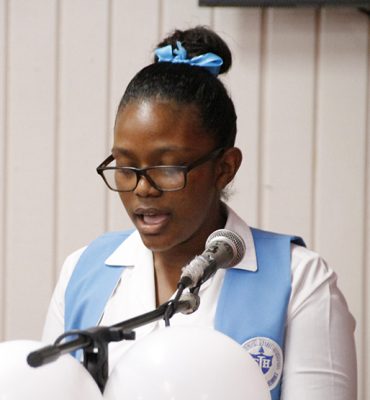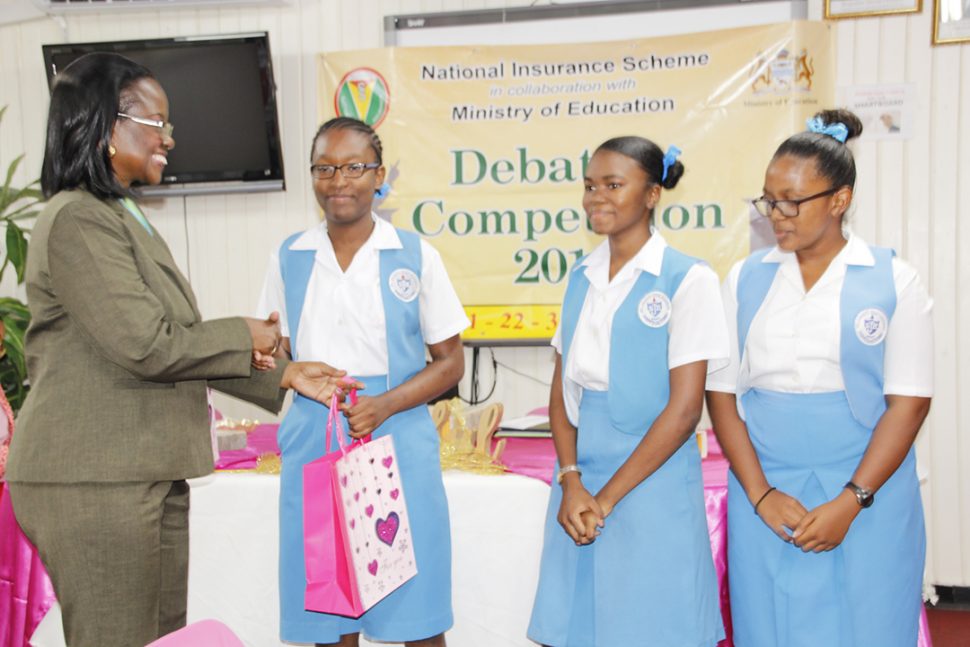After an hour-long debate on why improved Information Technology will or will not enhance the services offered to contributors and pensioners by the National Insurance Scheme (NIS), St Joseph High school emerged victorious, defeating their opponent, Queen’s College (QC) and six other schools.
To celebrate its 50th anniversary, NIS collaborated with the Ministry of Education and hosted a series of debating competitions among eight secondary schools in Georgetown. The participating schools included the Bishops’ High School, St Rose’s and St Stanislaus high schools, and Brickdam, North Georgetown, and Christ Church secondary schools. The two finalists were Queen’s College and St Joseph High.
The final debating competition was held at the National Centre for Education Resource Development (NCERD), located on Battery Road, Kingston. The teams debated the moot: “Improved Information Technology will enhance the services offered to contributors and pensioners by NIS.”

The St Joseph team, which opposed the moot, consisted of Adaiah Lawrence, Chelsea Forde and Carmalita Byrne, while the QC team, which proposed the topic, consisted of Kristen Richardson, Ajaih Griffith and Larulie Khanhai.
The QC team argued that improved technology will eliminate the slow manual services, which takes up a tremendous amount of time. They stated that persons should take into consideration the pensioners who are seen standing in long lines at NIS after working and serving the country. They noted that due to that fact, pensioners often complain about bodily pains because distribution takes longer. “It’s unfair that the people who have contributed to the development of Guyana would have to endure slow manual services,” first speaker, Richardson said.
As it relates to improved technology, Griffith then stated that it would be so much easier if technology were used, giving persons choices rather than restricting them to one. As such, she noted that the employees of NIS will be able to serve their customers better with the use of improved technology. She then offered a solution to the hours patrons
usually spend standing in line, saying that instead of that, NIS can transfer monies directly into their bank accounts instead. She noted that having spoken with the Public Relations Officer of NIS, it was revealed that they are currently thinking of implementing that very solution. “There will be no more standing in long lines, no more hurdles on paper work, no more inconvenience on the poor,” she ended her statement.
Third speaker, Khanhai, then spoke about the disadvantages of manual services, citing the security risk it poses to the company. She stated that post offices, which serve as a medium for NIS, in the past have been broken and entered, which resulted in the theft of millions of dollars. She stated that not only can technology benefit NIS but other companies as well, and noted that in order to ensure maximum security, NIS should follow in the footsteps of more advanced countries, which will dissolve the numerous complaints against them.
The St Joseph team in response, stated that improved technology has many disadvantages and limitations. They noted that Guyana is currently facing electricity problems and if there is no electricity, technology is useless.
“If we are constantly having blackouts, how will we be able to power the technological devices that we use every day?” Bryne asked the audience. Forde then said that many people have trouble understanding the basic systems of computer
literacy, especially the older persons and many pensioners do not have the basic computer skills. “You can lead a horse to water but you can’t make him drink,” she quoted. She then stated that workers misuse the services provided for purposes other than work and it can reduce productivity at the work place if it is not monitored by employers. “It will only be benefitting the employees of NIS,” she boldly stated.
In conclusion, Lawrence said that there are other important factors that must be taken into consideration, most notably the fact that the hinterland will not be benefitting from the improved technology, as currently residents living in those areas are denied electricity, running water or cellular networks. “NIS must consider the entire country not only the coastland regions,” she ended.
After the debate, it was no surprise to the audience— which comprised mostly of NIS employees— who won and before the winners were announced, they were whispering to each other, “St Joseph is the winner.” After announcing the winners of the debate, the chief judge applauded the performances of the students, stating that they had performed excellently during the course of the debating competition. She noted that both teams showed tremendous research ability.
Forde won the best speaker trophy and told this newspaper that preparing for the debate competition was very difficult, especially since it entailed so much of their time. She said that they had one and a half weeks to prepare and they were going to school on Saturdays, in addition to skipping lunch hours and staying later after school. She noted that the team was “very satisfied with the results.”




